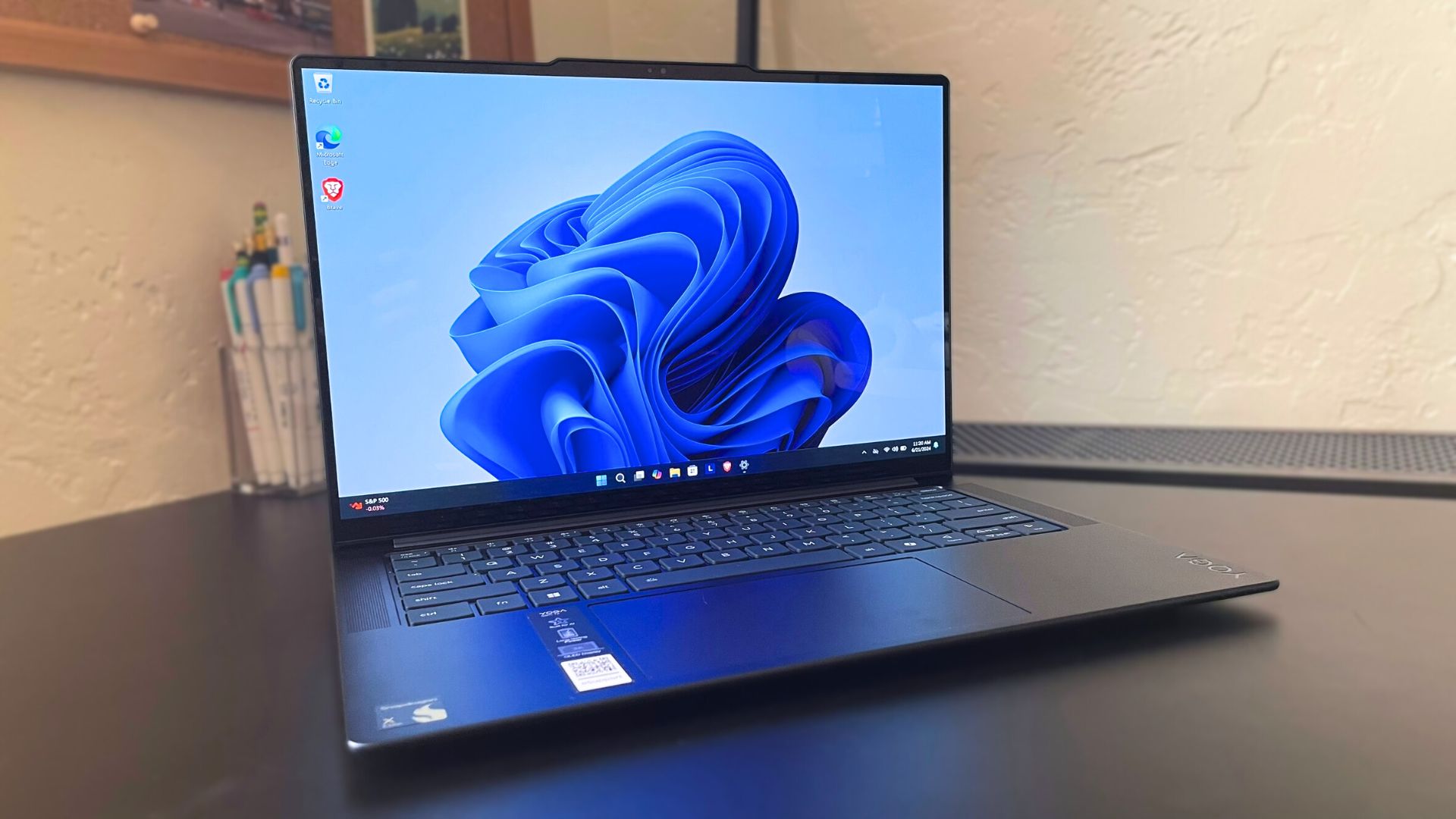On June 18, the first wave of Copilot+ PCs finally launched, including the Lenovo Yoga Slim 7x, which could give the MacBook Air M3 serious competition. Laptop Mag is putting the Yoga Slim 7x through the paces in our thorough lab tests, which have already revealed some exciting results.
At $1199, the Lenovo Yoga Slim 7x is similar in price to the MacBook Air M3 and features a similarly slim, sleek design. Could this Copilot+ PC also become the MacBook Air’s biggest rival?
Copilot+ PCs are a new series of Windows laptops running Microsoft’s Copilot AI platform, enabling various on-device AI features. The launch of the first Copilot+ PCs comes just a week after Apple revealed its own on-device AI platform at WWDC 2024, which will arrive on macOS in stages over the next several months. These back-to-back announcements are setting the stage for a heated AI PC showdown.
Here’s a look at how the Lenovo Yoga Slim 7x fared in our performance benchmark testing and how it compares to the MacBook Air M3.
Geekbench and Handbrake

After months of speculation, we finally get some hands-on benchmark testing results for the first wave of Copilot+ PCs. The Lenovo Yoga Slim 7x came out swinging with some awe-inspiring results on our performance tests. It scored a whopping 13750 on Geekbench 6 and completed the HandBrake video transcoding test in five minutes and 16 seconds.
Those results are well above our premium laptop average of 9,910 on Geekbench 6 and 8:07 on the HandBrake test. The Lenovo Yoga Slim 7x outperformed the MacBook Air M3 and the MacBook Pro M3.
The Yoga Slim 7x scored over 1,600 points higher than the MacBook Air M3 on Geekbench 6 and over 1,700 points higher than the MacBook Pro M3. It also outpaced the Air by over a minute on the HandBrake test. The MacBook Pro M3 came fairly close to the Yoga Slim 7x on HandBrake, though, falling just 22 seconds behind.
| Laptop | Geekbench 6 (multi-core) | HandBrake time |
|---|---|---|
| Lenovo Yoga Slim 7x | 13750 | 5:16 |
| MacBook Air M3 (13-inch) | 12087 | 6:32 |
| MacBook Pro M3 (14-inch) | 11968 | 5:38 |
These results hint at how powerful the Yoga Slim 7x’s CPU is. It’s equipped with the Qualcomm Snapdragon X Elite X1E-78-100, the lowest-tier Snapdragon X Elite variant. You wouldn’t know it from these test results, though. If the lowest-power version of the Snapdragon X Elite can blow Apple’s M3 chips out of the water, the more powerful X13-80-100 and X1E-84-100 variants could be groundbreaking.
These results bode well for the Lenovo Yoga Slim 7x, indicating that it could be a stellar laptop for creative and productive tasks like video editing, design, or everyday web browsing. However, there is one area where it fell a bit short in our first round of performance tests.
Where the M3 MacBooks still have the advantage
In an ironic twist, the M3 MacBooks showed stronger gaming performance in one of our core graphics tests compared to the Lenovo Yoga Slim 7x. Macs aren’t typically seen as top gaming devices, but Apple has been trying to change that with the M-series chips, so this might not come as a surprise. The M3 chip features significant graphics improvements over Apple’s previous chipsets, including support for ray tracing.
Of course, neither MacBook can compete with the best gaming laptops regarding gaming-specific performance. However, it’s worth noting the gap between the M3 MacBooks and the Lenovo Yoga Slim 7x in our Sid Meier’s Civilization VI: Gathering Storm graphics test:
| Laptop | Sid Meier’s Civilization VI: Gathering Storm (1080p) |
|---|---|
| Lenovo Yoga Slim 7x | 20.8 fps |
| MacBook Air M3 (13-inch) | 41 fps |
| MacBook Pro M3 (14-inch) | 51 fps |
What’s next: More testing and a full review
We’re running additional graphics tests with several other games, so we will soon look more in-depth at the Lenovo Yoga Slim 7x’s gaming performance in our full review. However, at first glance, the MacBook Air M3 achieved about twice as many frames per second in Sid Meier’s Civilization VI: Gathering Storm than the Lenovo Yoga Slim 7x. The MacBook Pro M3 scored about three times higher than the Yoga Slim 7x with 51 frames per second.
While the Yoga Slim 7x’s gaming performance could be better, remember that many games may not yet be optimized for Arm architecture. Some games are also not natively compatible with Qualcomm chips, such as those revealed on the Samsung South Korea website last week. The Yoga Slim 7x’s overall benchmark results are still fantastic, so don’t count it out on gaming just yet.
Our full review will provide more detailed information about the Lenovo Yoga Slim 7x’s overall gaming performance. We will also soon publish in-depth test results and reviews for all of the other new Copilot+ PCs. So, stay tuned for more test results, insights, and details from Laptop Mag.

